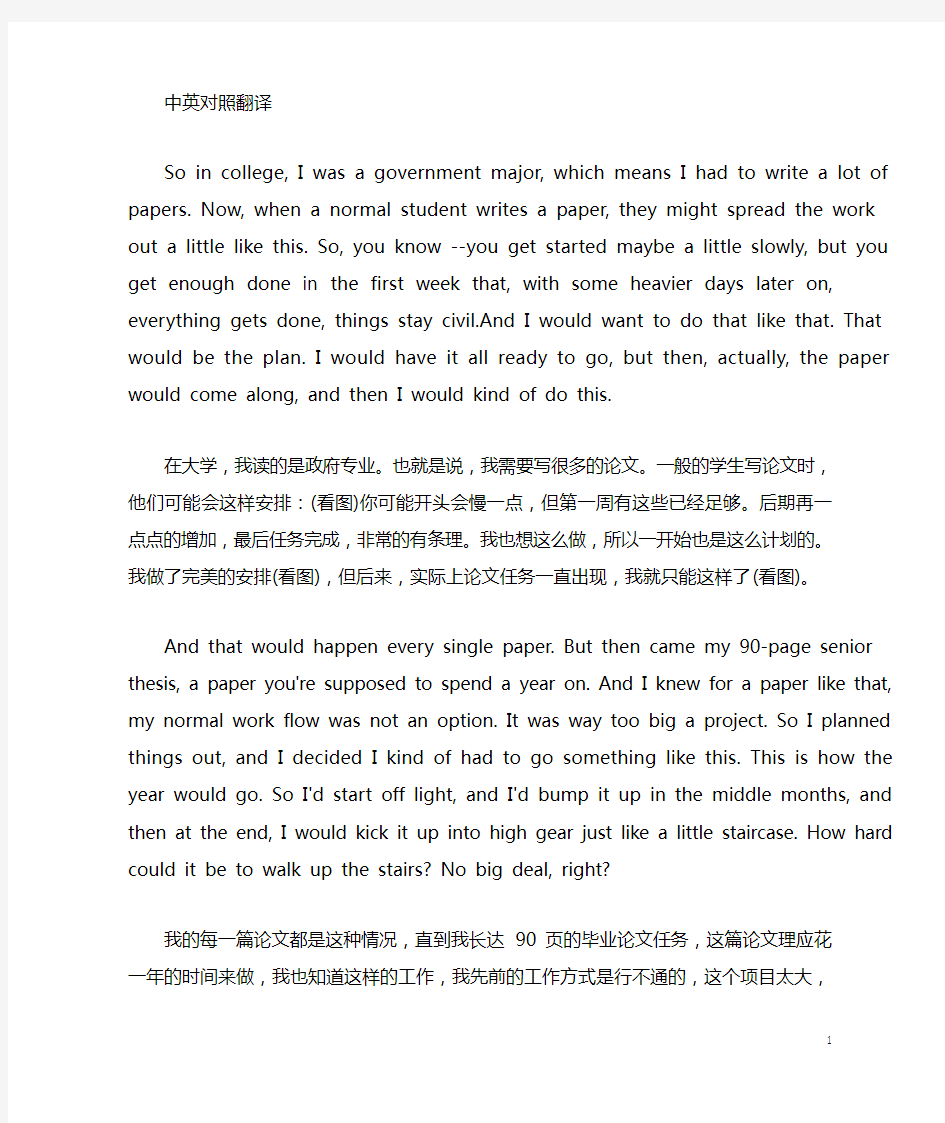(完整版)ted拖延症中英

- 1、下载文档前请自行甄别文档内容的完整性,平台不提供额外的编辑、内容补充、找答案等附加服务。
- 2、"仅部分预览"的文档,不可在线预览部分如存在完整性等问题,可反馈申请退款(可完整预览的文档不适用该条件!)。
- 3、如文档侵犯您的权益,请联系客服反馈,我们会尽快为您处理(人工客服工作时间:9:00-18:30)。
中英对照翻译
So in college, I was a government major, which means I had to write a lot of papers. Now, when a normal student writes a paper, they might spread the work out a little like this. So, you know --you get started maybe a little slowly, but you get enough done in the first week that, with some heavier days later on, everything gets done, things stay civil.And I would want to do that like that. That would be the plan. I would have it all ready to go, but then, actually, the paper would come along, and then I would kind of do this.
在大学,我读的是政府专业。也就是说,我需要写很多的论文。一般的学生写论文时,他们可能会这样安排:(看图)你可能开头会慢一点,但第一周有这些已经足够。后期再一点点的增加,最后任务完成,非常的有条理。我也想这么做,所以一开始也是这么计划的。我做了完美的安排(看图),但后来,实际上论文任务一直出现,我就只能这样了(看图)。
And that would happen every single paper. But then came my 90-page senior thesis, a paper you're supposed to spend a year on. And I knew for a paper like that, my normal work flow was not an option. It was way too big a project. So I planned things out, and I decided I kind of had to go something like this. This is how the year would go. So I'd start off light, and I'd bump it up in the middle months, and then at the end, I would kick it up into high gear just like a little staircase. How hard could it be to walk up the stairs? No big deal, right?
我的每一篇论文都是这种情况,直到我长达90页的毕业论文任务,这篇论文理应花一年的时间来做,我也知道这样的工作,我先前的工作方式是行不通的,这个项目太大,所以我制定了计划。决定按照这样的方式工作,这样来安排我这一年。(看图)开头我会轻松一点,中期任务逐渐增加,到最后,我再全力冲刺一下。整体是这种阶梯式安排,一层一层走楼梯有多难?所以没什么大不了的,是吧?
But then, the funniest thing happened. Those first few months? They came and went, and I couldn't quite do stuff. So we had an awesome new revised plan.
And then --But then those middle months actually went by, and I didn't really write words, and so we were here.And then two months turned into one month, which turned into two weeks.
但后来,好笑的事情出现了,头几个月时光匆匆而逝,我还没有来得及动工,所以我们明智的调整了计划。然后,中间的几个月也过去了,我还是一个字也没有动,眨眼就到了这里,然后两个月变成了一个月,再变成了2周。
And one day I woke up with three days until the deadline, still not having written a word, and so I did the only thing I could: I wrote 90 pages over 72 hours, pulling not one but two all-nighters -- humans are not supposed to pull two all-nighters -- sprinted across campus, dove in slow motion, and got it in just at the deadline.
一天我醒来,发现离交稿日期只剩3天了,但我还一个字都没写。我别无选择,只能在接下来的72小时里,连续通宵两个晚上赶论文——一般人不应连续通宵两个晚上。90页赶出来后,我飞速冲过校园,像电影中的特写慢镜头一样,恰好在截止日期前的最后一刻交上。
I thought that was the end of everything. But a week later I get a call, and it's the school. And they say, "Is this Tim Urban?" And I say, "Yeah." And they say, "We need to
talk about your thesis." And I say, "OK." And they say, "It's the best one we've ever seen." That did not happen.It was a very, very bad thesis. I just wanted to enjoy that one moment when all of you thought, "This guy is amazing!" No, no, it was very, very bad.
我以为事情就这么完了,但一周后,我接到一个电话,是学校打来的。他们说:“你是Tim Urban 吗?”我说:“是。”他们说:“我们要说一说你的毕业论文。”我说:“好啊。”他们说:“这是我见过最棒的论文。”……当然不可能。论文非常非常的差劲。我只想享受下你们对我的崇拜,想听你们说:“这老兄太厉害了。”没有,其实写的非常差劲。
Anyway, today I'm a writer-blogger guy. I write the blog Wait But Why.And a couple of years ago, I decided to write about procrastination. My behavior has always perplexed the non-procrastinators around me, and I wanted to explain to the non-procrastinators of the worldwhat goes on in the heads of procrastinators, and why we are the way we are.
不管怎样,我现在成为了一个博客写手,经营着“wait but why”这个博客。几年前,我决定写写拖延这件事。我的行为方式总让身边非拖延者感到不能理解。我很想对世界上非拖延者的人解释一下,我们拖延症患者的脑子是什么样的,为什么我们会拖延。
Now, I had a hypothesisthat the brains of procrastinators were actually different than the brains of other people. And to test this, I found an MRI lab that actually let me scan both my brain and the brain of a proven non-procrastinator,so I could compare them.
I actually brought them here to show you today. I want you to take a look carefully to see if you can notice a difference. I know that if you're not a trained brain expert, it's not that obvious, but just take a look, OK? So here's the brain of a non-procrastinator. Now ... here's my brain.
首先我假设,拖延症患者的大脑实际上和其他人的大脑不一样。为了验证这一点,我找了家核磁共振实验室,给我和另一个确定是非拖延症的人,进行了脑部扫描,我好将二者进行对比,今天我带到现场,给大家展示一下。我希望大家仔细观察,看能不能注意到差异。我知道大家并非专业的大脑专家,较难看出他们的差异,但大家不妨先看一眼,如何?这张是非拖延者的大脑,这张是我的大脑。
There is a difference. Both brains have a Rational Decision-Maker in them, but the procrastinator's brain also has an Instant Gratification Monkey. Now, what does this mean for the procrastinator? Well, it means everything's fine until this happens. [This is a perfect time to get some work done.] [Nope!] So the Rational Decision-Maker will make the rational decision to do something productive, but the Monkey doesn't like that plan, so he actually takes the wheel, and he says, "Actually, let's read the entire Wikipedia page of the Nancy Kerrigan/ Tonya Harding scandal, because I just remembered that that happened.
两张是有一点不同,两个大脑都有一个理性决策人,但在拖延症患者的大脑里,还有一个及时行乐的猴子。那这对拖延症患者来说意味着什么呢? 这意味着平时没什么异样,但一旦发生了以下的情况,理性的决策人做出理性的决策,要去做一些实际的工作,但猴子不喜欢这个计划,所以他抢过方向盘,说道:“说实话,我们还是去维基百科上查一查NKTH的丑闻吧。”因为我刚想起来还发生过这件事。
